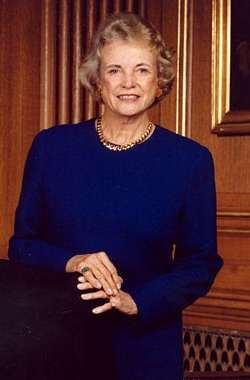The Volokh Conspiracy
Mostly law professors | Sometimes contrarian | Often libertarian | Always independent
Today in Supreme Court History: September 25, 1981
9/25/1981: Justice Sandra Day O'Connor takes the oath.

Editor's Note: We invite comments and request that they be civil and on-topic. We do not moderate or assume any responsibility for comments, which are owned by the readers who post them. Comments do not represent the views of Reason.com or Reason Foundation. We reserve the right to delete any comment for any reason at any time. Comments may only be edited within 5 minutes of posting. Report abuses.
Please to post comments


Remember that day, went to a Friday Night Braves game against the Reds, (who still had Davey Concepcion, Johnny Bench, George Foster, and Ken Griffey (the original, not Jr) in the lineup.
Braves lost 10-2 with an announced crowd of 7,817 (maybe 1/10 still there by the end)
at old Fulton County Stadium, it's a parking lot now, someone should write a song.
Oh, Sandra Dee Oconnor, like some Chinaman said, "A journey of a thousand miles begins with a single step" (those Chinamen said alot of obvious things)
First step on the way to "Dobbs"
Frank
Three justices in 1873 argued it was the natural place of a woman not to be a lawyer. The Chief Justice dissented without opinion. The other justices decided it on non-sex grounds.
This fairly belongs to the police power of the state, and, in my opinion, in view of the peculiar characteristics, destiny, and mission of woman, it is within the province of the legislature to ordain what offices, positions, and callings shall be filled and discharged by men, and shall receive the benefit of those energies and responsibilities, and that decision and firmness which are presumed to predominate in the sterner sex.
https://supreme.justia.com/cases/federal/us/83/130/#tab-opinion-1967597
One of the first applications of The Slaughterhouse Cases. Because there are essentially no privileges and immunities protected by the 14th Amendment, hers were not abridged. The legal principle that laws five justices don't like must violate another part of the 14th Amendment had not yet evolved.
The state court applied the common law rule that a married woman could not contract in her own name. If a state can say a wife has no legal identity apart from her husband's, a state can say a woman can't be a lawyer. In Massachusetts the disabilities of married women were abolished by statute starting in the late 19th century. I don't have a timeline of when this trend spread around the country.
"The legal principle that laws five justices don't like must violate another part of the 14th Amendment had not yet evolved."
The Slaughterhouse Cases did apply the principle that the 14th Amendment didn't mean what five justices didn't "like" it to mean (IOW, they interpreted the law and determined what it meant).